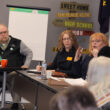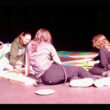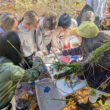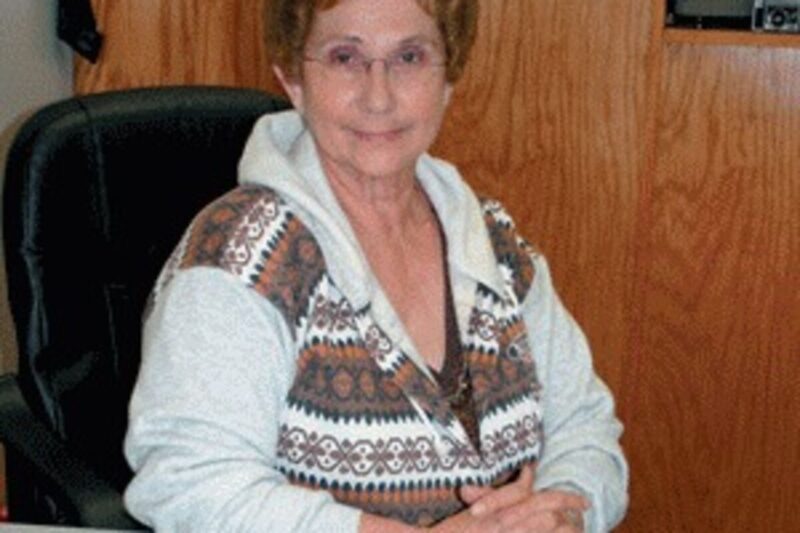Scott Swanson
Of The New Era
Bessie Lovik got interested in dogs during the 1960s while she was living in Germany, where her husband Martin was stationed in the Army.
Sgt. Martin Lovik was the American team sergeant at a German Air Force NATO missile site about 45 minutes from Bonn. Unlike many military families overseas, the Loviks had developed relationships with Germans in their community. One of the local families raised German shepherds and Bessie “fell in love” with one of the puppies.
“I bought a 14-month-old German shepherd, joined a German dog club, and learned from Germans how to train a German shepherd,” said Lovik, 65. “I really got into German shepherds.”
In the years since, she’s been a dog breeder, trainer, exhibitor and international show judge.
After buying that first young shepherd, which she called Peggy, she got her registered, which is a much more exacting process in Europe than it is in the United States, she said.
A male German shepherd, for instance, must have four X-rays over a two-year span to check for hip problems, then must pass tests in obedience, tracking and attack, then must complete a confirmation show before it can be bred, Lovik said.
“Each breed has its own standard,” she said. “Terriers have to pass tests for burrowing, since that’s what they were bred for. Gun dogs, which is what they call sporting breeds, have their own tests.”
Her own name proved to be a little bit of a problem, though.
“In Germany, Bessie is a dog’s name, particularly for German shepherds,” she said, adding that people often were confused as to which was the dog and which was the owner when she showed Peggy, who had a much longer registered name.
After Martin retired from the military in 1979, the Loviks moved back to Sweet Home, settling in the house in the Liberty area in which Bessie Lovik grew up.
She started a German shepherd kennel, did “a lot of obedience work” and taught dog obedience classes at Linn-Benton Community College.
“I didn’t do a lot of showing then,” she said.
That was partly because she had a family – sons Marty, Bill and John.
But after her boys moved out, she started showing dogs and judging dog shows, mostly in World Federation of Dog Shows and International All Breed Canine Association events.
In addition to German shepherds, she also bred rottweilers and Brittany spaniels.
“Then I got this hare-brained idea that I wanted to run the Iditarod, despite the fact that my adult sons told me I was a fool,” she said.
She started working with Siberian huskies, but after some trouble with arthritis, she decided she was “too old to run three miles a day,” let alone do 1,150 miles in the Alaskan winter.
“I gave up on Siberian huskies,” she said.
She got her first shih tzu in the 1990s. She started breeding the dogs, establishing Lovett Kennels with a friend, Trudy Scott, and showing them.
“They seemed to be such adaptable dogs, good with children and seniors,” she said. “I was like Roosevelt, who wanted to see a chicken in every pot. I wanted to see a shih tzu in every home.”
She currently has seven breeding-age females and five stud males, all with grand champion lines, she said.
She has judged in 25 international shows, though only four in the past two years because, she said, she is raising two granddaughters, both 10, and a 14-year-old grandson.
“It’s hard to keep up with the little girls,” she said. She has a total of 16 grandchildren and four great-grandchildren, with two more on the way.
But she doesn’t rule out the possibility of participating in more shows.
“There’s a big show coming up in Helsinki, Finland, in March that, if I get invited to, I will do,” she said. “I don’t show any more because there tends to be a conflict of interest, even if you’re not from the same organization. You get on a first-name basis with the judges, then you show.”
She also occasionally trains dogs, “but not too often. It’s too much work and I’m too old. By the end of the year I’ll have six great-grandchildren.”
Lovik said she prefers working with some of the less well-known canine registration organizations and she’s had a tenuous relationship with the American Kennel Club, which suspended her for 10 years in April after she refused to allow club representatives to inspect her kennels.
“The AKC will tell you what dog you can breed to what dog and what dog you have to do a DNA on,” she said, referring to DNA testing that is used to police dog registrations by kennel clubs.
“I wouldn’t sign their form.”
She said that inspectors came to her kennel when she had litters due and, due to local problems with parvo virus, a virulent sickness that can wipe out a litter of puppies, “nobody comes on the property when a litter’s due.”
“It’s a very political, back-biting situation,” she said of her experience with AKC events. “And it’s very expensive. When you go to Westminster, the Super Bowl of dog shows, you can count on spending $4,000 for a week.”
Once, in 1982, she was showing a German shepherd at Westminster Kennel Club dog show, the best known in the dog world, when she found herself up against a dog owned by comedian Bill Cosby.
“I didn’t get past the gate,” she said, though she stayed to watch Cosby’s dog win.
There’s less bad blood in the international shows she’s been involved in, she said.
“The people are more interested in each other and their dogs,” Lovik said. “It’s less political than the AKC.”
She tells the story of one show in which a judge approached her and asked if she would show an Irish wolfhound whose handler had fallen ill.
“I’d never in my life showed her dogs – two Brittany spaniels, two Siberian huskies and a shih tzu – ended up with 18 best of breed or better awards.
In the end, though, the reason she’s been involved in the shows is “the dogs.”
“I can find beauty in any breed of dog,” she said. “It’s really exciting for me to see a dog do what it’s been bred to do.”





